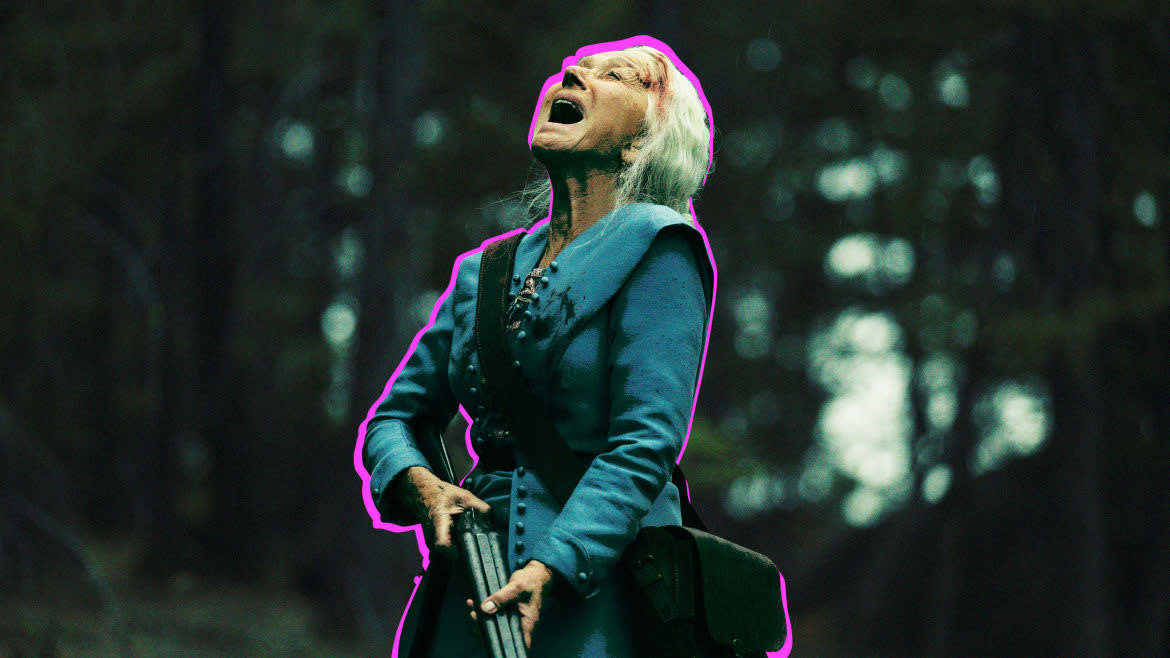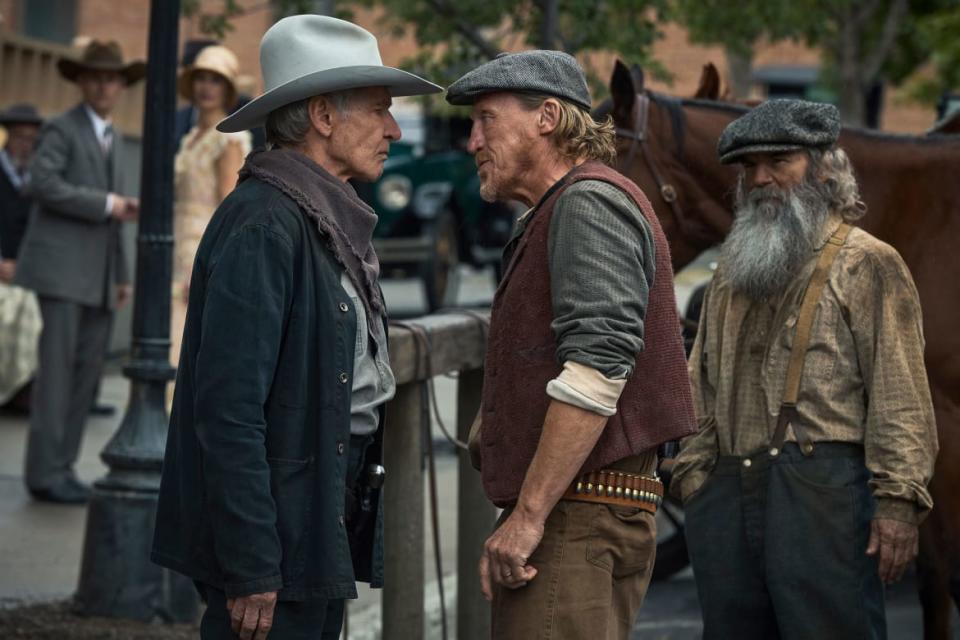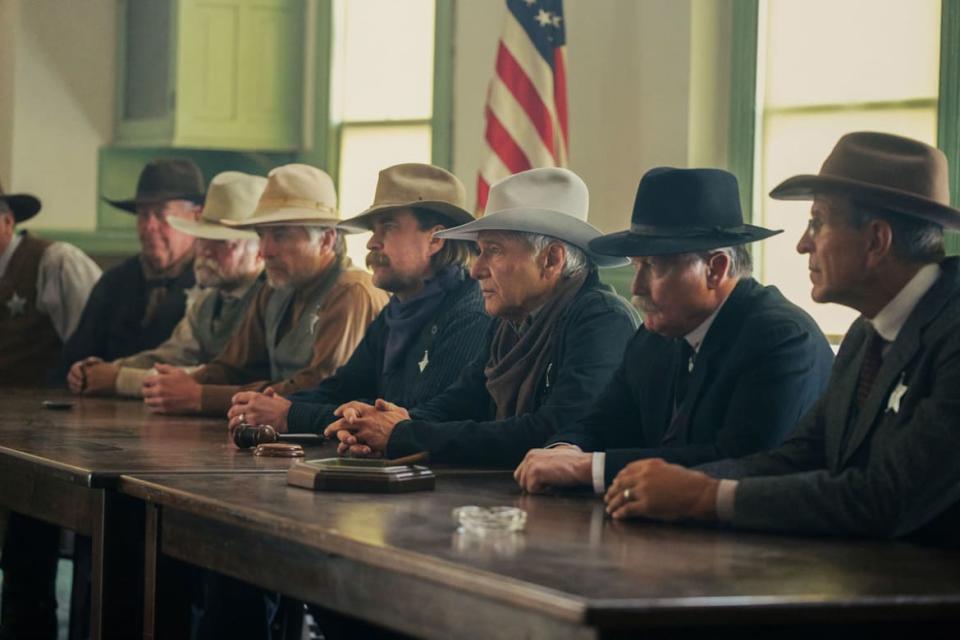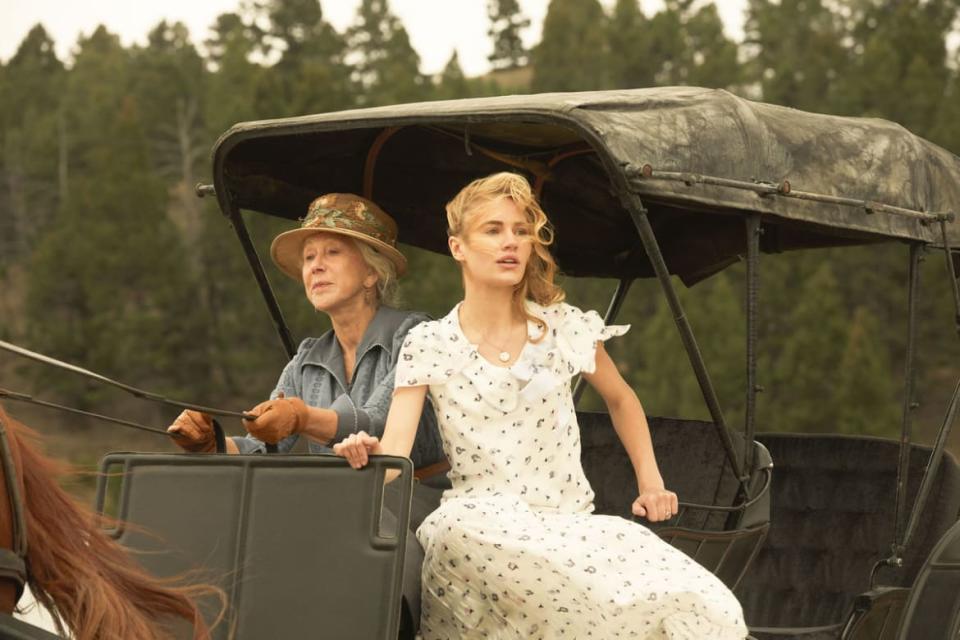‘1923 Review’: Harrison Ford and Helen Mirren’s New Show Won’t Be the Next ‘Yellowstone’

- Oops!Something went wrong.Please try again later.
- Oops!Something went wrong.Please try again later.
Taylor Sheridan’s Yellowstone is rooted in the clash between the old and new worlds, and that conflict also rears its head in 1923, his second prequel spin-off from his hit TV series. (1923 follows last year’s 1883.) Premiering on Sunday on Paramount+, it’s another capable notch in the writer/director’s belt, albeit one that’s too conservative—narratively speaking—for its own good.
The prime selling point of 1923 is its headliners: Harrison Ford and Helen Mirren, here starring as the larger-than-life parental figures tasked with maintaining their frontier Montana clan’s power, influence, and health.
Ford is Jacob Dutton, the brother of 1883’s James Dutton (Tim McGraw) and the great-grand uncle of Yellowstone’s John Dutton III (Kevin Costner)—or, at least, that seems to be the lineage at play, since Sheridan doesn’t bother explaining the clan’s family tree. Regardless of such ties, however, Jacob is the head of the Yellowstone ranch, having taken it over with wife Cara (Mirren) and, in doing so, become the father figure to his nephews John Dutton Sr. (James Badge Dale), Jack (Darren Mann), and Spencer (Brandon Sklenar).
As embodied by Ford in the premiere (which was all that was provided to press), Jacob is a no-nonsense cowboy who carries himself like a bigwig—hence someone almost immediately yelling at him, “You’re no god, Jacob Dutton!” If he’s not the almighty, he’s definitely a man with clout, and 1923 illustrates that from the start via a brewing regional crisis: a swarm of locusts that have ruined the land, thereby putting everyone’s cattle in danger.
‘Yellowstone’ Season 5 Is Lazily Coasting on Its Extreme Popularity
Further complicating this is Banner (Jerome Flynn), whose sheep herds are encroaching on neighboring leases. This leads to a meeting at a council overseen by Jacob during which there’s debate about whether men, or the mountains, own the grass—a dialogue that provides an insightful peek into the sorts of dilemmas faced by ranchers of the era, if hardly qualifies as gripping drama.
“The herd comes first,” says Cara later in 1923, and though that sentiment pertains to Jacob’s issue with cattle and sheep, Cara states it in the context of a different issue: the impending wedding of Jack and Elizabeth (Michelle Randolph).

Jacob’s plan to save his cows involves moving them to higher ground, meaning that Jack’s nuptials must be postponed. Elizabeth finds this hard to stomach because, as Sheridan’s series explicates, a wedding is the only day in a 1920s woman’s life that’s just for her. Nonetheless, stomach it she must, since lady stuff comes second to manly concerns in this hard, rugged world—a truth, perhaps, but one that’s delivered with a clunkiness that engenders eye rolls.
It wouldn’t be a Sheridan Western without prolonged sequences of silhouetted cowboys riding horseback across the plains at dawn or hooting and hollering while rustling cattle. Unfortunately, director Ben Richardson’s wannabe-iconic images of the Old West are of a largely perfunctory nature, less a byproduct of inspiration than of obligation. Sheridan has, at this point, settled on a sturdy, unadventurous formula, and 1923 dutifully sticks to it. If you’ve seen one of his gruff, imposing patriarchs struggling to maintain control of his fiefdom and manage his kids’ problems, you’ve seen them all.

There are additional narrative threads in Sheridan’s latest, the first of which concerns Spencer, who’s not in Montana but, rather, in the wilds of Africa. There, along with two local comrades, he successfully stands his ground before a rampaging lion, killing the beast with a perfect shot. As flashbacks elucidate, Spencer is a hunky haunted veteran of World War I, and as in that battle, he doesn’t retreat from danger. He’s right at home in this far-away land because, as he tells a wealthy woman whom he’s hired to protect (along with her caravan) from a murderous leopard, he hails from a Montana that’s just “the mountain version of this place.” Think a broodier PTSD-afflicted Clint Eastwood, minus the charismatic steeliness.
1923’s maiden installment spends additional time detailing the horrific abuse suffered by defiant Native American girl Teonna (Aminah Nieves) at the hands of a tyrannical nun (Jennifer Ehle) at a religious school run by an even more violent headmaster (Sebastian Roché), who’s another uncompromising man in a show full of them (“I have compassion, but no mercy”). This storyline intriguingly expands the series’ scope, and unseen—but destined to also factor into this mix—are Jack’s mother Emma (Marley Shelton) and influential and ruthless businessman Donald Whitfield (Timothy Dalton).

They and others, such as Brian Geraghty’s Zane, will no doubt grapple with various romantic, financial and life-and-death predicaments throughout the course of this first season, even if they’re initially little more than minor variations on hackneyed types.
While Ford is asked to simply be dour, severe, and noble, Mirren serves as the tough, wounded heart of 1923. Affecting an Irish brogue that calls as much attention to her acting as to her character’s origins, the Oscar winner seems more than a bit out of place in this environment, no matter how expertly she tosses hay into the horse pen or how mournfully she expresses her longing (in writing) for Spencer to return home.
The Secret Anxieties of Harrison Ford
A mysterious introductory passage depicts Cara hunting down a wounded gunman in the woods and, after a race between the two to reload their weapons, killing him in cold blood, at which point she screams to the heavens in anguish—a sign that she’s as formidable as her husband. For now, though, Mirren feels like the odd woman out.
There’s no predicting precisely where 1923 is headed during this initial eight-episode season, but on the basis of its opener, it’s likely not straying far from the path, earnestly espousing down-home values and the supremacy of the rural to the urban. In the most overt articulation of the material’s ethos, Cara informs despondent Elizabeth that she’ll have to accept that every aspect of her life comes second to cattle (and men), but that in return—as a frontier woman—“you will be free in a way that most people can barely conceive.” If only 1923 itself were freer of Sheridan’s trademark clichés.
Get the Daily Beast's biggest scoops and scandals delivered right to your inbox. Sign up now.
Stay informed and gain unlimited access to the Daily Beast's unmatched reporting. Subscribe now.

